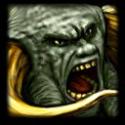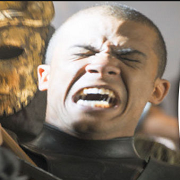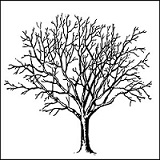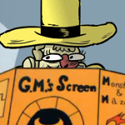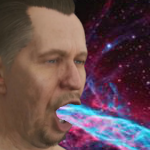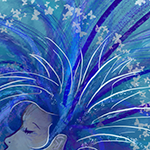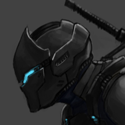|
Cyphoderus posted:Absolutely. I'm having a hard time wrapping my head around this, because aspects, once 'spent', are simultaneously True Facts and also not doing anything mechanically. Like, if I shoot out the lights, I can invoke it to cause the first guy to shoot at me in the Dark to miss, but after that everyone can effectively see and shoot just as well as they could before, even though narratively it's still dark? Or if I set someone On Fire and invoke it to defend against one of their attacks. Are they still on fire, narratively? If so, how do you handle that? Does it limit what they can do? Jack the Lad fucked around with this message at 17:34 on Jun 13, 2014 |
|
|
|

|
| # ? Jun 1, 2024 17:19 |
|
Also because Aspects are just true it can do things like make Stealth checks easier or Shoot checks harder even without paying an FP. You totally can have mechanical effects to a room being dark without having to deal with fate points.
|
|
|
|
Jack the Lad posted:I'm having a hard time wrapping my head around this, because aspects, once 'spent', are simultaneously True Facts and also not doing anything mechanically. There's also a "fiction first" thing at play; if it makes sense to have the Dark aspect stick around, it won't break anything to keep it. quote:Or if I set someone On Fire and invoke it to defend against one of their attacks. Are they still on fire, narratively? If so, how do you handle that? Does it limit what they can do?
|
|
|
|
Captain Walker posted:I would agree with Cyphoderus in that it's still dark, it just no longer grants a bonus because everyone is used to the dark/has their night vision out after the invoke. I think a better way to put it/look at it is that the aspect is still true...the room is Dark...but that the room being dark only matters to someone's action if they specifically work to make it matter, such as spending a free invoke or, since the aspect sticks around even once free invokes are used up, spending a fate point. You can always keep getting a bonus for the room being dark so long as that aspect continues to exist, provided you have fate points to spend and a willingness to do so, in which case you can keep leveraging that darkness to your advantage. In a way that's really what fate points are in fate...they aren't really a matter of save-your-rear end luck like bennies in other systems are, they're a measure of how much you really want to succeed at a particular action. "Aspects are always true" is a good cardinal rule for dealing with FATE. A room that has the "Dark" aspect is objectively and truly dark, and should be treated as such. Unlike other games, being "Dark" doesn't come with a prearranged list of conditional modifiers, the mechanical impact of the room being Dark is left up to the GM and players to determine via how much they want to compel/invoke that aspect to influence things. A lot of times aspects do get used for the free invoke and then sort of forgotten about, but it's always good practice to keep them in the back of your mind because A). even if they aren't giving you a +2 bonus at that moment they still exist and still have an impact on things and B). they provide a good avenue for invoking with fate points if none of your usual methods seem applicable or you need a way to invoke multiple aspects for a big, decisive roll. edit: Jack the Lad posted:I'm having a hard time wrapping my head around this, because aspects, once 'spent', are simultaneously True Facts and also not doing anything mechanically. Here's one way to look at it...if the players are hoping to hide from some guards then chances are that just standing around in a brightly lit room doesn't make any sense. How are they hiding? Maybe they could find some things to hide behind in there but eh, it seems like that'd be pretty tricky. The threshold for hiding successfully in such a situation would probably be on the higher side, the GM judges. Let's say that one of the characters kills the lights in the room before the guards arrive, placing the aspect "Dark" on the room. Now, without even having to get into mechanical gubbins, the aspect changes the fiction of the situation. Now it's a dark room, much easier to imagine hiding in. This time when the GM calls for Stealth rolls to remain hidden the difficulty is probably less in his estimation, and if someone rolls kind of poorly and really, really wants to remain hidden they can invoke that aspect for a boost (either for free or by paying FP if they don't have an appropriately stealthy aspect of their own to draw on). On the other hand, once the guards have passed if the players then use the opportunity to try and search that dark room for hidden clues or concealed switches or whatever, the GM is perfectly entitled to point out that the room is kind of, y'know, dark at the moment. If the players insist on trying anyway then the GM can either allow them to try but with an appropriately judged difficulty for fumbling around in a dark room or he could simply compel that aspect and tell them "sorry, you can't find anything in all this darkness." Kai Tave fucked around with this message at 17:55 on Jun 13, 2014 |
|
|
|
Jack the Lad posted:I'm having a hard time wrapping my head around this, because aspects, once 'spent', are simultaneously True Facts and also not doing anything mechanically. quote:Like, if I shoot out the lights, I can invoke it to cause the first guy to shoot at me in the Dark to miss, but after that everyone can effectively see and shoot just as well as they could before, even though narratively it's still dark? Again, the True Fact is "the room is dark". Here are some ways to represent it in FATE: • As an aspect, as we've been discussing; • Nothing at all. Darkness really doesn't matter in this context. • Darkness is a passive obstacle. Actions influenced by vision should exceed a certain point in the Ladder, because seeing in the dark is hard. • Darkness is an active obstacle. Actions influenced by vision should compete against an I Am Dark action taken by the room, rolled by the GM. • The room has a I Am Dark skill: it can do one or more of attacking, creating advantages, defending, and overcoming obstacles. Might be cool for a horror game where Darkness can actively attack someone's mental stress track. • The room has a Darkness stress track. The characters have to attack it by finding light sources: when it's gone, people can see again. Might be cool for a videogame-like set piece where characters have to light a room while under attack by ninjas or something. • Any combination of the above, including Darkness as a complete character with a skill list, stress track, and stunts. • Something else entirely, which amounts to Darkness as a stunt. The fact that the aspect is spent does not stop the True Fact about darkness from manifesting in any of the above ways. This decision is usually in the hands of the GM, and it really depends on tone and genre of the game and context of the scene. The fact that any narrative fact can be represented by any combination of mechanical elements is called the Fate Fractal, and it's the coolest thing about this game. quote:Or if I set someone On Fire and invoke it to defend against one of their attacks. Are they still on fire, narratively? If so, how do you handle that? Does it limit what they can do? Cyphoderus fucked around with this message at 18:20 on Jun 13, 2014 |
|
|
|
Jack the Lad posted:I'm having a hard time wrapping my head around this, because aspects, once 'spent', are simultaneously True Facts and also not doing anything mechanically. Oh god, On Fire. Basically, an Aspect is "always true". However, it is not always "important". If everybody is fighting in a dark room, then everybody is on equal ground and all that matters is that, narratively, you can't see very well. However, if you invoke the Dark Room to make a sneak attack, then you are making the darkness "important" for your action. Setting somebody on fire is a whole other kettle of fish, but generally the idea is that if you make that roll to Create An Advantage against their Athletic opposition or whatever, then you earned it and probably created a "Fire" NPC that is now attached to and trying to kill your target. Just the same, they have the option of Overcoming An Obstacle to put the fire out before it does too much damage. Basically, Creating an Advantage doesn't always just make an Aspect available. Sometimes you have to fractalize that Aspect and give it some of its own agency. So, as long as that target character is still On Fire, the fire can be invoked against him. The fire probably also tries its darndest to do fire things when its turn comes up, like hurt its "host" and spread more fire to nearby objects, but it's not quite a real character in that you can probably Overcome it as an Obstacle, rather than actually inflicting Stress on it. Edit: and, of course, to set somebody on fire, you have to have existing conditions in place for it to make sense. Create An Advantage isn't a free ride to conjure any old thing into place. You have to already have an open flame available, or be established somehow on your character sheet as a character with flame powers, or whatever. deadly_pudding fucked around with this message at 18:21 on Jun 13, 2014 |
|
|
|
Tagging and invoking aspects doesn't need to represent how true something is. It's a measurement of Dramatic Juice. Think about any movie where a villain Pulls a Knife in a fistfight. When they first Pull a Knife, they're creating an Advantage ( Probably Hidden Knife [-]). When they attack with it, they may tag it for a +2 and slash the hero's ribs. After that initial burst, the knife is still there, but it's out of dramatic juice. (Now, Hidden Knife can be replaced with Dirty Secret, The School is Laughing at You or Crooked Referee, but they all have the same purpose - a momentary advantage). Golden Bee fucked around with this message at 22:49 on Feb 18, 2016 |
|
|
|
Golden Bee posted:Tagging and invoking aspects doesn't need to represent how true something is. It's a measurement of Dramatic Juice. I guess it just feels like certain static situations that don't rely on surprise (e.g. a firefight in a dark room or a physical injury or state like having a broken wrist or being tied up) should work differently beyond the invoke. I do like Cyphoderus' idea of passive opposition for the firefight; that would mean even if you roll higher than their defence you miss unless you also beat the passive difficulty of the darkness, right? Darkness and fire as actual characters seems crazy to me, though. If setting someone on fire gives Team PC effectively another character on their side with its own initiative count and attacks, that seems like it would render other uses of CA basically obsolete. I'd assume they would all be carrying flamethrowers (or flasks of oil and torches or whatever's genre-appropriate) in short order. More generally, the fact that there are so many ways to do things is definitely cool, but it also makes it easy (for me at least, especially when GMing) to feel lost or unsure about which one to use. Jack the Lad fucked around with this message at 19:33 on Jun 13, 2014 |
|
|
|
Jack the Lad posted:I guess it just feels like certain static situations that don't rely on surprise (e.g. a firefight in a dark room or a physical injury or state like having a broken wrist or being tied up) should work differently beyond the invoke. When you're making a one-use-only aspect, make sure it's something that would make sense to only be around for a second. So instead of "Broken Wrist" maybe it's "Twitsted Wrist". quote:I do like Cyphoderus' idea of passive opposition for the firefight; that would mean even if you roll higher than their defence you miss unless you also beat the passive difficulty of the darkness, right? quote:Darkness and fire as actual characters seems crazy to me, though. If setting someone on fire gives Team PC effectively another character on their side with its own initiative count and attacks, that seems like it would render other uses of CA basically obsolete. I'd assume they would all be carrying flamethrowers (or flasks of oil and torches or whatever's genre-appropriate) in short order. A fire wouldn't side with one group. Here's a simple fire-as-NPC block off the top of my head: quote:Blazing fire
|
|
|
|
Jack the Lad posted:This is really helpful and makes a lot of sense to me, thanks. It's the same reason why people IRL don't use exclusively fire-based weapons. If your DM is doing his job right, then fire is really dangerous and unpredictable to use when you're talking about applications that can actually set a dude on fire. It's not that the fire is "on your side" because you Created it as an Advantage. The fire is just a fire, and it does its own thing. It's an advantage because, at the moment of its creation, it was being used against your enemy. However, with aspects, whatever's on the table plays. That fire could be doused out by quick action, or it could go out of your control and start spreading to things you didn't want it to. A dark room is a double-edged sword. You can invoke that darkness to get a surprise attack, but your enemies can use it to boost their evasion, too. More to the point, just because a room is dark, doesn't mean that "Darkness" should be an Aspect. Darkness isn't likely an important enough quality of that room to count. A big empty room with no lights is kind of dumb, and you get a lot more fictional weight from an aspect like "Boiler room". It implies there's a lot of machinery and steam pipes and poo poo in there, and it's probably in a basement. It gives you permission to do all kinds of stuff involving Stealth, Craft, and the like. It gives you reasonable permission to Create Advantages like "hidden behind pipes" or lets you invoke the "Boiler Room" to get a +2 to your attack by catching your target in a steam jet. You could try and make the boiler "Rigged to blow", and now your enemies, who presumably don't want their base to explode, have to let you escape while they try to undo your handiwork.
|
|
|
|
One of the most important rules in Fate, and one that I feel needs to be brought up more in the book, is not everything is an aspect.
|
|
|
|
Evil Mastermind posted:One of the most important rules in Fate, and one that I feel needs to be brought up more in the book, is not everything is an aspect. This, too. Sometimes an "advantage" is just that. They use the term "situational aspect", but it really just means that it's a status on a character or scene that only exists until it's either dealt with or doesn't make sense any more. Stuff like "in a headlock" or "kicked in the nards" falls under this category.
|
|
|
|
Jack the Lad posted:This is really helpful and makes a lot of sense to me, thanks. They do. A broken wrist, for example, would prevent you using a two handed weapon - and a darkened room might mean you can't see the enemy. But one thing you can get into is Duelling Aspects when you Create an Advantage. So, for example: A: Creates an Advantage by shooting out the lights, creating the aspect "Darkness" B: Creates an Advantage by throwing flares near the enemy to silhouette them. If A didn't invoke the Darkness to defend against the flares they can't now use it because the room is no longer dark. A: Overcomes an Obstacle by putting an upside down bucket on top of the flare (or putting it out). This cancels out the Silhouette aspect, removing it. And because the light source has gone, the room is back to Darkness so the aspect can be used again. quote:Darkness and fire as actual characters seems crazy to me, though. If setting someone on fire gives Team PC effectively another character on their side with its own initiative count and attacks, that seems like it would render other uses of CA basically obsolete. I'd assume they would all be carrying flamethrowers (or flasks of oil and torches or whatever's genre-appropriate) in short order. That would take way more than a normal advantage, however. A normal advantage would be to set their greatcoat on fire rather than all of them.
|
|
|
|
A couple more questions before I try to run this. One, what is the difference between a High Concept and an Aspect? It seems to me that a high concept is just like a strong aspect? Say, if my high concept is "Holy Warrior" I can invoke it or be compelled by the Dm to invoke it just like an aspect? Is this how it works? And also, Troubles. Are these basically negative-only aspects used by the GM to compel you to act in-character to earn fate points? I don't really understand them at all. These are questions about Fate Accelerated, if that matters.
|
|
|
|
The Dregs posted:A couple more questions before I try to run this. One, what is the difference between a High Concept and an Aspect? It seems to me that a high concept is just like a strong aspect? Say, if my high concept is "Holy Warrior" I can invoke it or be compelled by the Dm to invoke it just like an aspect? Is this how it works? quote:And also, Troubles. Are these basically negative-only aspects used by the GM to compel you to act in-character to earn fate points? I don't really understand them at all. Your High Concept and Trouble are just aspects like any other, and work the same as any aspect. The main thing is that your High Concept is the brief description of what your character's about (like "Elven Mage" or "Vampire Hunter") and your Trouble is basically your plot hook ("Wanted by the Elven Church for Heresy" or "Suffer Not A Monster To Live").
|
|
|
|
The Dregs posted:A couple more questions before I try to run this. One, what is the difference between a High Concept and an Aspect? It seems to me that a high concept is just like a strong aspect? Say, if my high concept is "Holy Warrior" I can invoke it or be compelled by the Dm to invoke it just like an aspect? Is this how it works? They're both still "just" aspects, but they are really central summations of what your character is about. You can still stumble over "dark and brooding vigilante" when trying to act like a charming rogue, and you can intimidate a mayor who doesn't want your trouble coming down on him with the fact that you're "pursued by the world-conquering tyrant."
|
|
|
|
OK, I see. So a trouble isn't necessarily a bad thing, but it usually is, at least as far as your character is concerned. A trouble of "Hates All Pirates" might come in handy if we get ambushed on the high seas and need to fight our way free. This system is rather elegant compared to my Shadowrun game.
|
|
|
|
Others have already explained High Concepts and Troubles, but it's worth bearing in mind that a lot of people try to make sure that more aspects of theirs beyond their Trouble has a double-edge to it because the more interesting ways your aspects can be compelled, either by the GM or by yourself (and remember that you can self-compel) the more avenues for gaining fate points you have. Not every one of your aspects has to be double-edged this way, it's totally fine to take aspects that are mostly positive in nature. The Trouble was simply a way for later FATE designers to help ensure that players didn't inadvertently create characters without any easily compellable aspects.
|
|
|
|
The Trouble is what complicates your life, it's not necessarily a downside. "Greatest Swordsman in all the Realms" works perfectly fine as a Trouble aspect, for example (because everyone's heard of you and young punks are going to challenge you to duels every five minutes), although you'd want a High Concept that explains why that's your Trouble and not your High Concept (e.g. "Retired Hero" or "On His Imperial Majesty's Secret Service," which explain why being recognised as the Greatest Swordsman is a pain in the rear end).
Lemon-Lime fucked around with this message at 11:01 on Jun 14, 2014 |
|
|
|
neonchameleon posted:They do. A broken wrist, for example, would prevent you using a two handed weapon - and a darkened room might mean you can't see the enemy. I think it's important to mention that aspects interact with the fiction more than the mechanics. In a dungeon and dragons game, something like a broken wrist would mean you would take X penalty for using your weapon one-handed on every swing, or they could pull out a backup one-handed weapon, basically sacrificing either damage or accuracy on every swing. Assuming, you know, they had a backup weapon and it's not 4 enchantment levels lower and unable to pierce the DR of whatever you're hitting. The loss of the hand is a concrete loss in power that affects every roll you make. Even so, it doesn't affect every outcome. Someone with a -2 penalty to attack could go on to swing 4 times and the only time they miss is when they rolled that one. The -2 penalty didn't really do anything. Aspects are different from the standard debuffs. Yes, they have mechanical weight. That broken wrist aspect can be Invoked to help the enemies dodge blows easily. It will also provide some passive opposition for tasks that normally wouldn't require a roll, like climbing up a rope. But AS LONG AS YOU CHANGE THE FICTION, it doesn't affect your attack rolls. Your wrist is broken, so you sheathe your claymore and pull out a longsword. You let your berserker rage take over and fight through the pain. You wield your massive buster blade in one hand as though it were hollow. Any of these things work, and it should be assumed that when you make your attack rolls, you aren't going to have any penalties to them. That's what the Invokes are for. Of course, there's one more way that these kind of aspects can hinder you: Compels. If the aspect is outright shutting you down, then it's a compel. From the SRD: Fate SRD posted:You have ____ aspect and are in ____ situation, so it makes sense that, unfortunately, ____ would happen to you. drat your luck. So you can say "You have broken wrist aspect and are in a deadly combat situation, so it makes sense that, unfortunately, being unable to properly wield Excaliborg and take advantage of your stunts would happen to you. drat your luck." or more simply "You have the Stunned aspect and are in a deadly combat situation, so it makes sense that, unfortunately, being unable to take an action would happen to you. drat your luck." For combat, I have two general rules of thumb for these kinds of aspects. First, you can't take more than 1 fate point from these compels with you after the combat. There's no point in farming them, it's use them or lose them. Second, when you're in danger of losing your action because of an aspect, you get an Overcome roll. Someone with the Stunned aspect for instance can roll their Physique. If they succeed, the aspect is removed, along with any free invokes it might have had. If they SWS, even better. If they fail though...that means that the aspect caused them to waste their turn doing nothing. That's a compel, and they get a fate point. That way, you don't really have any aspects that will take you out of the battle altogether. Those sort of effects should after all be reserved for when you're Taken Out. One more thing with Stunned. Even if a Fighter is Stunned, they can still use their action to Attack or Create Advantage. They'll simply do so while narrating that the action is done while confused and dazed, and Invokes will make the action a lot harder. Making sure that each action--Attack, Create Advantage, and Overcome Obstacle--have a purpose in both representing the fiction and in general tactics is important to me.
|
|
|
|
I ran my first game with the wife and kids last night. The kids had a hard time trying to figure out how to invoke and compel, the whole aspect thing was alien to them. They eventually got better at it though. They all had lots of fun. The group consisted of a runaway student wizard (the wife), a prehensile haired kid-ninja girl, a swarm of bee-fairies, and a dragonman with sword and shield. At the end of the session, I let them go to a fortune teller. They knew they were going t head to a troll cave next session, so I let them use fate points to create aspects in the cave through the fortune teller. So now the cave is both icy and fiery, plus it is infested with giant mosquitoes. I am not sure I will do that again, but they seemed to enjoy it.
|
|
|
|
That thing with the fortune teller sounds pretty rad. Technically FATE already has provision for players paying fate points to "declare a detail" which is a way for them to say things like "oh yeah, we need an expert safecracker, well it just so happens that I know that one of the best safecrackers in the business is living right here in this very city under an assumed name." Allowing them to declare details about a future event through the medium of a fortune teller is actually a clever way to utilize that. So the other day Ronwayne and I were chattin' about Atomic Robo and the subject turned to ways to give characters in a FATE game useful but not tremendously important NPC companions and sidekicks ala Only War's comrades and he came up with a really clever idea...use the mega-stunt gadget rules from Atomic Robo. A comrade is simply statted out like a piece of mega-stunt equipment...they have a Function aspect (or a Concept I guess) and a Flaw aspect and then around two stunts' worth of benefits that they can confer to whoever they're working alongside. Players can pay FP to invoke a comrade's aspect whenever it might be useful (for example, invoking a comrade's Former Army Ranger to help navigate a safe path through hostile territory) while the GM can compel a comrade's Flaw to cause the players trouble (the crusty, chainsmoking medic who's Too Old For This poo poo or the freelance hacker picks a bad moment to be Easily Distracted). Comrades shouldn't get involved in conflicts or challenges, they don't really do anything...they don't attack, defend, overcome, or create any advantages on their own, their abilities should simply enhance the PCs' own...but this also means you don't have to worry about tracking extra people in combat or anything either. Assume comrades make it through fights okay if the PCs do either by keeping their heads down or having their own little scuffles in the background. Of course one of the primary functions of sidekicks is to get in trouble and redshirts die all the time. Here's how comrades can get taken out ("taken out" meaning variously incapacitated, abducted, or gruesomely killed depending on the sort of game you're running): 1). The GM can choose to take a comrade by compelling it so. Since comrades are likely to be a group resource the compel is applied towards the group instead of an individual player (if the comrade is explicitly attached to a PC then it should apply towards that player as usual). If the GM compels a comrade in this fashion then he has to offer up two fate points instead of one. These fate points can be divvied up amongst the group however they feel like. If the players decide that they'd rather refuse the compel then they have to pay two fate points to the GM, taken from any player or players who choose to pay. 2). Comrades can be taken out as a consequence of player-characters being taken out or conceding a conflict. 3). As an optional bonus rule, if a comrade is involved in a physical conflict alongside the player-characters, at any point a player may choose to have them be taken out in order to absorb a 4 shifts worth of stress from any single attack, the equivalent of a moderate consequence. The comrade has to be in a position to have plausibly been caught by the attack aimed towards the player-character...within the same zone is a good rule of thumb, but depending on the nature of the attack and the conflict in question this could be expanded upon. Doing so should take the comrade out of play for at least the rest of the session assuming they don't die outright.
|
|
|
|
>Two Posts away from Retirement
|
|
|
|
So a while ago I posted a bunch of Inverse World Accelerated stunts and got some feedback on them! (End result based on responses: "gently caress it, close enough, let's do this".) Since then, after working on Breakfast Cult and reading more Fate material, I've decided that stunts are better when they're written in a more conversational tone with a few common shorthand terms instead of small blocks of text that spell out exactly how everything works in detail. Now I'm making Gnome hold back on it while I redo them anyway.  On the bright side, totally flows better now.
|
|
|
|
I played some Venture City Stories, got depressed, and wrote a blog post about it.
|
|
|
|
Thank you for writing that, I ran into the same problem in my Venture City game. I was pretty sure I had to be misinterpreting something, but nope, it seems it's just some broken rules.
|
|
|
|
You're welcome. It's cool that in this day and age, Rob Donoghue already got forwarded the blogpost on Google+ and he and Fred Hicks have had a public conversation about what it should have been, and they're going to get with the main writer, Brian Engard, and try to work out what happened and what should get changed. Whereas back when I started in the hobby, it would have taken weeks for my letter to go to Dragon Magazine, get published and have a snarky "you're a stupid babby who is playing the game wrong" reply from TSR.
|
|
|
|
Wow, when I first read VC stories, I totally missed that. I guess it's really because when you look at the book, you think "Oh wow, rules for playing superheroes!" So I devoured the rules for making superheroes, but only glanced at the rules for running a game for them. Players aren't going to be concerned with that, and Fate GM's I think all have their own style of how to handle adventures and games so that they aren't really looking for too much advice. That's what happened with me at least.
|
|
|
|
Quick question: does the Diaspora book include its own FATE-variant of the core rules, or will I need to know core before diving into Diaspora? Worse-yet, will I need some older version of FATE in order to play?
|
|
|
|
Gerbil_Pen posted:Quick question: does the Diaspora book include its own FATE-variant of the core rules, or will I need to know core before diving into Diaspora? Worse-yet, will I need some older version of FATE in order to play? Diaspora is a self contained book, but it is an older version of FATE than Core.
|
|
|
|
That said, it's still playable, if a Mitama fucked around with this message at 07:51 on Jul 6, 2014 |
|
|
|
A little discussion regarding the shoot skill please! So, as it stands, shoot is causing me a few problems. I'm looking at a setting with lots of gunfighting, and it's looking that it's going to make athletics basically a required skill, and I don't really want to force anyone to take a particular skill. (As well as, if I'm reading right, shoot being flat out better than fight on paper since it can reach 2 zones. That can be fixed by making melee weapons just better I suppose) I'm trying to think of some ways to work it, it wasn't really a problem in the game I ran ages ago since I made the badguys extremely weak in a test run and the heroes rolled over everyone. Obviously there are things like "in cover" as a freely invoked aspect to help defend, but it doesn't feel quite enough to me. I'm aware I'm overthinking it, but I dunno, it's easy for a badguy to get a positive aspect to invoke on his shooting too, and to be fair, sometimes when someone is cowering behind a wall athletics just doesn't feel like a particularly appropriate thing to be rolling Theres also a particular bugbear - Shooting is kind of standalone, I guess? If I'm a terrible shot, and you are standing over there somewhere, it probably doesn't matter a drat that you are a terrible nerd with 0 athletics, I'll miss regardless and your poor athletics doesn't even factor into it. With that in mind I'm currently thinking of combining a static and an opposed into one for shooting at range. The static would be pretty easy, to be fair, something like "your final score must be at least the number of zones your opponent is away" and then you just compare the ability checks as normal. Other options - a given piece of cover has a defense skill and you just use that if you want to, or maybe I'm overthinking wildly and it really doesn't matter. A final thing to note - we'll probably be using Freds "5 squares to a zone, 7 squares for an attack range" grid play variant, which will probably make angles and cover a bit more of a thing than they usually are in fate.
|
|
|
|
Here's the deal. Current skill balance in vanilla FATE Core is that Fight can both attack and defend with or without weapon. Shoot can attack at range but not defend. And Athletics can defend and create advantages but not attack. But you don't have to go with this. For example, you could use a Tactics or Battle Sense skill instead, which can be used to crate advantages and to defend against attacks by things like making best use of cover without compromising your offense. And there're variants that just ditch the Fight/Shoot divide and go with a general Combat skill. In general, customizing your skill list can be useful. EDIT: One example change might be having Shoot covering ranged defense, Fight covering melee defense, and Athletics covering both. This does tend to make guns superior, but that isn't necessarily a problem in a genre where guns dominate anyways. And Fight still has applications in some situations, such as when someone's managed to get right in your face, or you can't use your guns because you don't want to attract attention or you don't have them. As for static versus dynamic difficulties for shooting, that's just one of the many details FATE glosses over. It's not strictly speaking something you really need to worry about, but if you really want to think about it, what you've laid out is probably the easiest way to implement it. Kaja Rainbow fucked around with this message at 14:57 on Jul 6, 2014 |
|
|
|
Gerbil_Pen posted:Quick question: does the Diaspora book include its own FATE-variant of the core rules, or will I need to know core before diving into Diaspora? Worse-yet, will I need some older version of FATE in order to play? It's self contained, but uses an older version of the rules, and has entirely new rules for squad level combat, social and ship combat. Also a very good world generation system, my favourite part of the rules. The ship combat was over-complex imo, but one of my players really liked it. We didn't use the squad rules, instead I just zoomed out and modelled each unit as a character. In general, it seems to be trying to turn fate into a much more tactical game by bolting new subsystems on, which seems to be missing the point to me. Having played diaspora and looked at bulldogs, I'd definitely recommend the latter. Diaspora was still hella fun, but the rules weren't really adding much, and were over-complex. (If you do go for diaspora, I'd really recommend halving the number of aspects characters have, we houseruled to that after a few sessions and it helped loads)
|
|
|
|
I somehow managed to forget that Diaspora has 36 skills. 
|
|
|
|
Including the oh-so-useful zero gee skills if I'm remembering right. I seem to recall taking one look, and house ruling them together.
|
|
|
|
TurninTrix posted:I somehow managed to forget that Diaspora has 36 skills. yeah it's really mad. might as well have like, good housekeeping skills in there as well.
|
|
|
|
I'm looking to run FATE for a group this coming weekend, but I'm dissatisfied with the way the health system in FATE Core works. Namely, I dislike that your street tracks are derived off of individual skills, because it means that you have to make room in your skill list for HP. What I had in mind was sort of grouping the skills into physical/mental and then deriving the number of additional stress boxes my players get for each based on the number of skills they have in each. Am I going to break the system doing this? Are there alternative stress calculation systems in existance I could look at?
|
|
|
|
QuantumNinja posted:I'm looking to run FATE for a group this coming weekend, but I'm dissatisfied with the way the health system in FATE Core works. Namely, I dislike that your street tracks are derived off of individual skills, because it means that you have to make room in your skill list for HP. What I had in mind was sort of grouping the skills into physical/mental and then deriving the number of additional stress boxes my players get for each based on the number of skills they have in each. Am I going to break the system doing this? Are there alternative stress calculation systems in existance I could look at? You could always just give everyone 3 Stress, maybe 4 if they happen to take high ranks in Physique/Will. It does lessen the usability of Physique and Will a bit. Though Will still gets used a fair bit in any game where people'll be making social attacks. And Physique's more for specific concept characters, really. There's also what Atomic Robo does with having it based off the highest of several skills (which is simpler than the solution you suggested).
|
|
|
|

|
| # ? Jun 1, 2024 17:19 |
|
Kaja Rainbow posted:There's also what Atomic Robo does with having it based off the highest of several skills (which is simpler than the solution you suggested). That was my initial inclination, but I was hesitant to have my players game it (one of my players in particular loves the minmaxing, even in systems where it's so secondary it's laughable). I'll probably do that, thanks!
|
|
|



